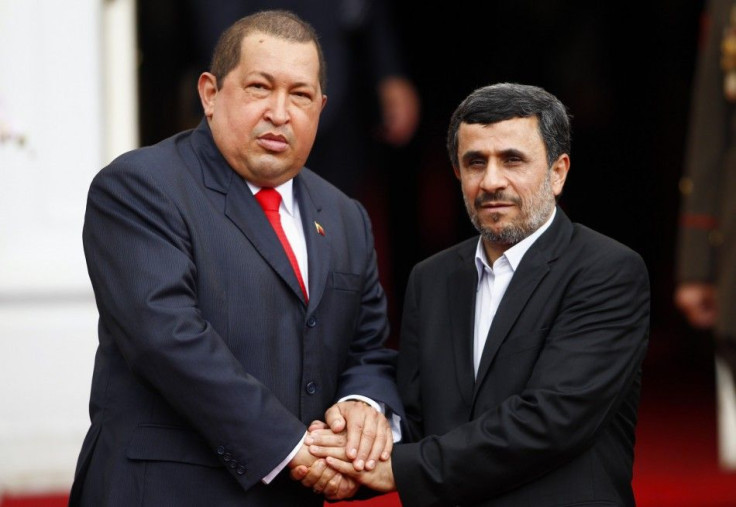Iran’s Threat In America’s Backyard
Opinion

The recent launch of talks between Iranian and Argentine officials over how to improve relations between their countries is troubling enough from a moral standpoint, but the strategic implications are even worse.
Buenos Aires long ago concluded that Tehran directed Hezbollah’s 1994 bombing of a Jewish community center in the Argentine capital that killed 85 people and injured more than 300 others, and Iran is also suspected in the 1992 bombing that destroyed Israel’s embassy in Argentina.
For the 1994 bombing, Buenos Aires has unsuccessfully sought the extradition of five top Iranian officials, including then-President Akbar Hashemi Rafsanjani and Ahmad Vahidi, the former commander of Iran’s elite Quds Force who’s now Iran’s defense minister.
Tehran has never fessed up to its role, and United States and Israeli officials fear that Argentine President Cristina Fernandez de Kirchner plans to paper over the problem and join Iran’s growing ranks of allies in Latin America.
Morality aside, the Iranian-Argentine talks are another example of how Tehran, with a strong assist from Venezuelan strongman Hugo Chavez, is expanding its diplomatic, economic and military presence in America’s neighborhood, mounting an increasingly serious threat to U.S. national security.
Washington is beginning to notice -- with Defense Secretary Leon Panetta recently announcing a new Western Hemisphere Defense Policy Statement to strengthen U.S. military ties to its allies and other regional powers -- but U.S. officials will have to do much more to confront the mounting challenge to our south.
Chavez is a flamboyant, America-baiting, Jew-hating demagogue. He formed and heads a regional bloc that includes Bolivia, Nicaragua and Ecuador and has sought to plant his vision of “21st-century socialism” across South America as a direct challenge to U.S.-led free-market capitalism.
He’s also Iran’s most important friend in the region, key to its efforts to evade global sanctions over its nuclear program and sidestep U.S.-led efforts to isolate the regime diplomatically. He has called his ties with Iran a “holy matter,” visited Iran more than nine times, helped Tehran launder money and evade international financial sanctions and, according to Businessweek, signed more than 100 agreements with Iran’s Holocaust-denying President Mahmoud Ahmadinejad.
Chavez has given Venezuelan passports and visas to scores of Middle Eastern terrorists -- who could use them to enter the U.S. -- and he has sent arms to Hezbollah and given safe haven to its trainers, operatives, recruiters and fundraisers who increasingly roam south of our border.
Chavez reportedly engineered the Argentine-Iranian talks, presumably to help Iran expand its circle of regional allies. When, in early October, Chavez won his close (and heavily rigged) race for reelection as Venezuela’s president, Argentina’s Kirchner tweeted, “Your victory is also ours. Go Hugo.”
Ahmadinejad, in turn, has visited the region six times in the last six years, and his government has expanded its embassies and cultural centers in Venezuela, Bolivia, Nicaragua and Ecuador. Meanwhile, regular flights between Tehran and Caracas shuttle terrorists between the two capitals.
Early this year, U.S. Director of National Intelligence James Clapper told Congress that Iranian officials had “changed their calculus” and are “now more willing to conduct an attack in the United States.” He also said “they’re trying as well to penetrate and engage in this hemisphere.”
Around that time, House Foreign Affairs Committee Chairman Ileana Ros-Lehtinen said that, through its alliances with Chavez and his fellow Latin American dictators, Iran has a “platform to carry out attacks against the United States, our interests and allies” either directly or through its terrorist clients.
The potentially good news for Washington (in an admittedly cold-blooded sense) is that Chavez is dying of cancer. Nobody knows how long the strongman will survive -- though he almost surely will not serve the full six years of his new term -- but a post-Chavez Venezuela could be a much different place.
Chavez’s electoral opponent, Henrique Capriles Radonski (who received 45 percent of the vote), had promised to dramatically change the nation’s course, arguing that Chavez’s Bolivarian 21st-century socialism had done more to affect the region than to help Venezuelans. In a country in which crime is rampant and the economy is in a shambles, that message will continue to resonate deeply.
The question, of course, is whether Chavez’s cronies who help run his narco-state will allow a fair election once he’s gone. Among those with a vested interest in maintaining the regime are its regional allies Bolivia, Nicaragua and Ecuador, its big-power allies Russia and China, and, of course, Iran and Hezbollah.
That leaves Washington with two tasks.
The first is to shine a bright U.S. light on Iranian activities in Latin America that Chavez is facilitating and to craft a robust strategy to confront them before the U.S. national security threat grows much larger.
The second, when Chavez dies, is to shine a bright global light on the need for a fair election to replace him, boosting the chances that the opposition will prevail and take the country in a much different direction.
Lawrence J. Haas, former communications director for Vice President Al Gore, is a senior fellow at the American Foreign Policy Council and author of “Sound the Trumpet: The United States and Human Rights Promotion" (just out from Rowman & Littlefield).
© Copyright IBTimes 2024. All rights reserved.





















